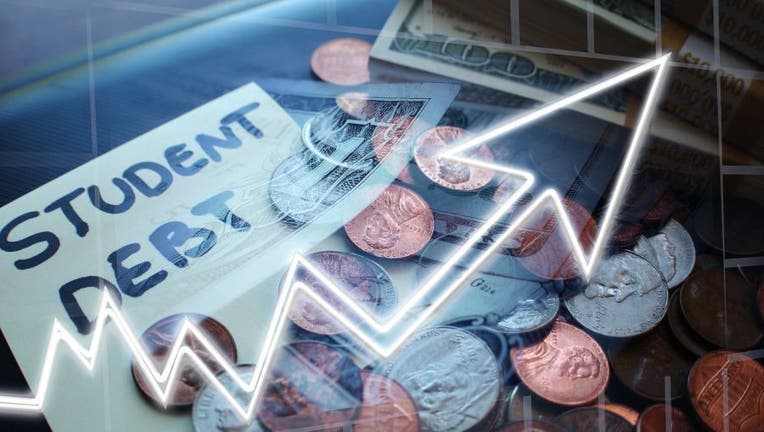How to refinance high interest rate student loans

Refinancing high interest private student loans could save you money. Find out what's involved in refinancing high interest private loans so you can see if this option is right for you. (iStock)
For many students, taking out loans to pay for school is essential. But student loans can be a major financial burden if you borrow at too high a rate. When your Annual Percentage Rate (APR) is high, you'll pay more for the privilege of borrowing, less of your payments will go towards reducing principal, and repaying your debt will be more costly in the end.
The good news is, if you've taken out expensive private student loans, you aren't stuck with them until you've finished paying off your debt. You may be able to refinance high-interest student loans to save considerable money and make the payback process easier.
Online marketplace Credible can help you compare student loan refinance companies to ensure you find the cheapest rates available.
Refinancing simply involves getting a new loan to pay back the old one. There are many private student loan refinance companies that will work with you to provide the funding to do this -- but you'll want to shop around to find the best one for your situation so you can maximize your savings.
What is a high-interest rate for student loans?
Federal student loans come with low fixed interest rates that are the same for all borrowers who take out loans during a given academic year -- but that's not the case for private student loans. Your rate will vary depending on which lender you select, whether you have a fixed or variable rate student loan, your loan term, and your credit score.
Because there can be a wide variation in rates, it can be difficult to know if the rate on your loans is too high or not. You may have a higher rate than someone else in your class, but it may still be a good rate for you because your credit score is lower or because you chose a fixed-rate loan rather than a variable one (fixed-rate loans often come with higher starting rates but there's no risk of them going up). See what kind of rates you qualify for today.
WHY YOU SHOULD REFINANCE STUDENT LOANS NOW, ACCORDING TO A FINANCIAL EXPERT
Still, looking at rates on current student loans can give you an idea of whether your rate is a reasonable one or not. For example, lenders on Credible.com offer fixed-rate student loans ranging between 3.62 percent to 14.50 percent APR and variable rate options from 1.24 percent to 13.19 percent. If your interest rate is at the upper end of this range, or higher, chances are good you have high-interest private student loans.
When should I refinance my student loans?
Refinancing student loans makes sense if you can qualify for a lower rate loan than you're currently paying on your private student debt. Most lenders don't charge a fee for refinancing, and you aren't giving up any borrower benefits when you refinance one private loan with another private lender so there's little reason not to refinance if doing so can save you money.
Credible's online student loan refinancing calculator can help you see how much you'll save by refinancing. Using the calculator, you can see what your new monthly payments and interest cost would be. If you can drop your payment and lower the total amount of interest you'll pay over time, going forward with getting a new loan makes a lot of sense.
STUDENT LOAN INTEREST RATES AT HISTORIC LOWS — HOW TO SAVE MONEY BY REFINANCING
If you have federal student loans, however, you should typically avoid refinancing unless you're certain you won't take advantage of any of the borrower protections unique to federal loans such as Public Service Loan Forgiveness, flexibility in repayment options, income-driven payment plans, or generous options for forbearance and deferment.
How do I refinance my student loans?
Refinancing your student loans involves finding a new lender offering a loan at a lower rate, then applying for and getting approved for the loan. Your new lender will either repay your existing loans directly or provide you with money to do so. You'll then have a new loan to repay.
The key to successfully refinancing, however, is to shop around to find the most affordable new loan possible. It's a good idea to compare rates from several different lenders to see who can offer you the best deal. Credible makes that easy by offering a rates table that shows you rates from multiple lenders at once without affecting your credit score. Visit Credible today to see if you can qualify for an affordable student loan refinance loan so you can make getting out of debt both faster and easier.
HOW TO CHOOSE THE BEST STUDENT LOAN REFINANCING OFFER
When should I not refinance my student loans?
Although refinancing makes sense if you can save money, you don't want to refinance your private student loans if you'd end up costing yourself money by doing so. If you cannot qualify for a lower interest rate, for example, you will likely want to stick with your current lender.
If you're very close to repaying your student debt, refinancing likely also wouldn't make sense -- especially if your new loan had a longer repayment term. If you stretch out the time to pay back what you owe, you could end up paying more in total interest costs, even if you reduce your APR.
Refinancing with a new lender that charges a high origination fee or prepayment penalties may also be a bad move, especially if you aren't saving substantially on interest or if you plan to pay off your debt ahead of schedule.

